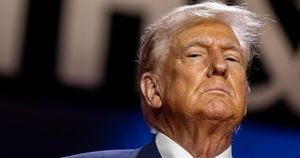Pete Hegseth, the Army National Guard veteran and well-known Fox News host recently nominated by former President Donald Trump to oversee the Department of Defense, is now facing scrutiny following revelations about his past. Specifically, he was flagged as a potential "Insider Threat" due to tattoos associated with white supremacist groups, raising serious concerns about his suitability for such a high-profile position.
This situation stems from communications within the D.C. National Guard back in January 2021. A fellow service member, Master Sergeant DeRicko Gaither, sent out warnings referencing Hegseth's tattoos. Gaither included photographs of Hegseth, which showed some tattoos linked to extremist ideologies, particularly the Jerusalem Cross, which has been adopted by various far-right groups over recent years.
Hegseth’s promotion to lead the Department of Defense was met with skepticism not only because of these tattoos but also his outspoken views. He has publicly criticized the Pentagon’s initiatives aimed at tackling extremism within the military, labeling the efforts as “fake” and “manufactured.” He contends these measures are pushing out honorable servicemen and women, pointing to what he describes as mischaracterizations of patriotism as racism.
On January 14, 2021, amid the growing controversy over Capitol riots and military involvement, Hegseth's tattoos came under review. Gaither communicated concerns about the implication of Hegseth’s body art, which some see as problematic, especially for someone likely to serve as the face of the U.S. military management and oversight.
During his military career spanning nearly two decades, Hegseth has had multiple deployments including Iraq and Afghanistan and earned two Bronze Stars. Despite these accolades, his political affiliations and public persona have cast shadows over his current nomination.
His presence at the Capitol during the insurrection, which he later downplayed, has made some question his commitment to bipartisan defense efforts and his ability to unify service members.
Back during the Capitol riots, Hegseth suggested through social media channels and his publications, including his recent book “The War on Warriors,” which he stated only “a few” active-duty members were present during the insurrection. This perception contrasts sharply with the dozens of military veterans who have since faced legal repercussions for their involvement.
Further complicity lies with his previous remarks around the prosecution of military members involved with controversial actions during deployments. These remarks highlight his lobbying efforts to secure pardons for servicemen, including individuals convicted of classifications like murder.
Hegseth's stance on military legal affairs does not end with advocating pardons. He has openly criticized the terms of engagement set forth by military lawyers, recounting scenarios from his own experiences where he felt the regulations inhibited decisive action against insurgents.
Looking at Hegseth's military background, his tattoos could be seen as expressions of faith according to some experts, like Heidi Beirich from the Global Project Against Hate and Extremism. Yet, the association with hate groups necessitates careful examination. Certain tattoos tied to Christian motifs have been claimed by violent extremists, making it difficult to discern their original intent without proper contextual analysis.
The Pentagon's immediate response to extremism reports following the Capitol events has been described by political figures as necessary but politically charged. The dialogue around Hegseth’s nomination feeds directly back to larger issues faced by the military today on both leadership fronts and personal conduct of service members.
The nomination process for Hegseth serves as more than just individual scrutiny; it mirrors the crossroads at which the military currently stands, challenged by internal divisions and external criticisms. Hegseth's potential leadership questions whether his appointment might galvanize reforms within military culture or exacerbate existing tensions.
The outcome of Hegseth's nomination will reflect on Trump’s broader defense strategies. Should he be confirmed, it may signal heightened acceptance of controversial figures within military leadership, which might pose challenges to already strained relations among troops.
With just weeks until the scheduled confirmation hearings, Hegseth’s past tattoos and views on extremism might not just put him on the hot seat, but his nomination might redefine what leadership looks like within one of the nation's most significant departments. This scenario opens up discussions not only about Hegseth but all military service members—how they are perceived, how they present themselves, and the legacy they contribute to the growing narrative of military extremism.



